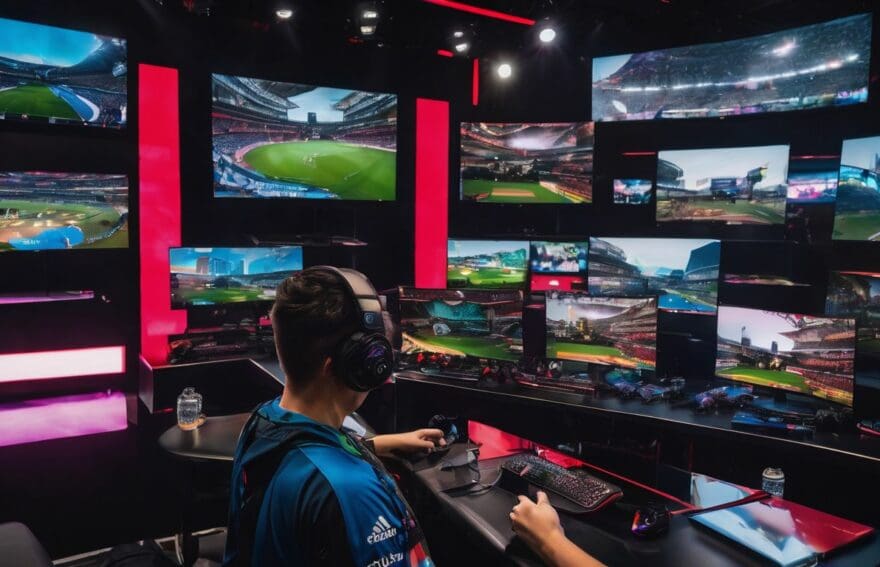Esports Merchandising: A Lucrative Avenue for Teams and Leagues

Updated On: November 11, 2025 by James Connolly
As ardent admirers of the ever-thrilling esports universe, we’ve often found ourselves pondering over how teams and leagues manage to keep the success ball rolling. We’re on this quest together; taking a deep dive into the economics that run beneath the electric currents of esports, it’s become clear that merchandise is far from mere fanfare – it’s an absolute treasure trove.
Unearthing our findings, we’ve come across cunning strategies wielded by teams to transform kit and knick-knacks into hefty revenue drivers. Keep your eyes peeled – our forthcoming revelations will lay bare the artful tactics of merchandising mastery in the dynamic world of esports.
The Lucrative Business of Esports Merchandising
Esports teams make money through various revenue sources such as prize money, team sponsorships, and exclusive merchandise sales. However, there are also significant costs and investments involved in maintaining a successful esports merchandising business.
How Esports Teams Make Money
In the world of competitive gaming, we find ourselves in awe of how esports teams turn their digital battles into real-world wealth. These squads rake in cash through several key channels, one of which is merchandising.
Just like traditional sports, fans love sporting jerseys, hats, and other gear that flaunt their favourite teams’ logos and colours. This fan loyalty isn’t just good for team spirit; it’s great for the bottom line as merchandise sales pump significant funds into team coffers.
Our teams also land major deals with sponsors who want to tap into the gaming community’s fervour. Tech giants, energy drink brands, and lifestyle companies shell out big bucks to have their logos associated with top players and squads—after all, about 90% of a team’s revenue can come from these partnerships alone! We compete hard not only for glory but for prize money too, which often reaches dizzying heights at international tournaments.
Broadcasting rights add another layer of income; when our matches are streamed across various platforms worldwide, broadcasters pay teams for the privilege. With each victory and strategic deal secured, we increase our chances at financial success in this thrilling billion-dollar esports industry.
Revenue Sources
After understanding how esports teams make money, it’s important to delve into the specific revenue sources that contribute to their profitability:
- Sponsorships and Advertising: Many esports teams derive around 90% of their revenue from sponsorships and advertising partnerships, which play a pivotal role in their financial success.
- Tournament Winnings: Prize money from tournaments serves as another significant source of income for esports teams, allowing them to bolster their financial standing through competitive success.
- Broadcasting Rights: Securing broadcasting rights for live streaming events and content can provide a steady revenue stream for esports teams and leagues, facilitating greater financial stability.
- Merchandising Sales: Esports merchandise sales represent an increasingly lucrative avenue for teams and leagues to engage with fans and drive additional revenue, contributing to the overall economic viability of the industry.
- Ticket Sales: Revenue generated from ticket sales at live events and tournaments also adds a valuable stream of income for esports organisations, broadening their financial scope.
Costs and Investments
As we delve into the financial aspects of esports merchandising, it’s vital to consider the costs and investments involved in this burgeoning industry. Esports teams and leagues allocate substantial resources toward creating and marketing their merchandise.
From design and production costs to distribution channels and promotional activities, there are various expenses that teams must manage effectively. Additionally, investing in high-quality materials, innovative designs, and strategic partnerships is crucial for garnering fan interest and driving sales.
Balancing these expenditures with potential returns requires careful budgeting and financial planning to ensure long-term sustainability.
Furthermore, establishing an online marketplace or physical store presence involves initial capital outlay along with ongoing operational expenses such as inventory management, staff wages, and marketing efforts to drive foot traffic or website visits.
The Growing Market for Esports Merchandise
Nerd Street Gamers’ recent $11.5 million fundraising round, Newzoo’s predictions for the growth of the esports market in 2021, and strategic partnerships and acquisitions by companies like Esports Entertainment Group indicate a booming market for esports merchandise.
With big-name brands like Samsung, Adidas, and Skillz making significant investments in esports teams, the opportunities for growth and expansion are evident.
Nerd Street Gamers Raises $11.5 Million
Nerd Street Gamers secures a substantial $11.5 million in funding, indicating a significant vote of confidence in the future of esports. The investment signifies the growing potential and attractiveness of the gaming industry, highlighting increased opportunities for career development and revenue generation within esports.
This further solidifies the fact that electronic sports (esports) is swiftly evolving into a multi-billion-dollar industry, attracting both enthusiasm and financial backing from various sources.
Newzoo’s Esports Trends for 2021
Newzoo’s recent report on esports trends for 2021 highlights the continued growth and potential of the global esports market. The report emphasises how esports has emerged as a billion-dollar industry, offering numerous career opportunities, particularly in fan engagement and loyalty programmes.
With its expanding reach, the industry is witnessing new revenue streams such as merchandise sales, sponsorships, media rights, and in-game purchases. These trends reflect the increasing interest from brands and investors in partnering with esports teams and leagues to tap into this lucrative avenue.
Esports merchandising continues to be a significant factor contributing to team revenue streams. As highlighted by Newzoo’s analysis, it serves as an essential part of building successful brand partnerships within the industry.
Strategic Partnerships and Acquisitions by Esports Entertainment Group
Esports Entertainment Group has been actively pursuing strategic partnerships and acquisitions to expand its presence in the esports industry. The company’s acquisition of Helix eSports and ggCircuit demonstrates its commitment to creating a comprehensive ecosystem for gamers.
These moves have allowed Esports Entertainment Group to offer a range of services, including tournaments, gaming centres, and collegiate leagues, catering to the diverse needs of esports enthusiasts.
Furthermore, through its partnership with Harris Blitzer Sports & Entertainment, Esports Entertainment Group secured access to an extensive network within traditional sports that could open up new opportunities for expansion.
The company’s proactive approach towards strategic collaborations and acquisitions reflects its ambition to position itself as a key player in the rapidly evolving esports landscape.
Samsung’s Multi-Platform Sponsorship with Enthusiast Gaming
Samsung’s sponsorship with Enthusiast Gaming exemplifies the strong commitment of big tech brands to esports. The multi-platform approach reaches a wide audience, leveraging Samsung’s influence to engage passionate gamers and attract novice gamers through various gaming channels.
This strategic partnership opens up new branding opportunities for Samsung in the esports space, tapping into the growing market for esports merchandise and solidifying its position as a leader in gaming technology.
Enthusiast Gaming, as one of the largest gaming networks globally, provides Samsung with access to a diverse community of esports fans, offering potential for increased brand visibility and engagement.
Adidas’ Partnership with G2 Esports
Adidas’ partnership with G2 Esports signifies the increasing involvement of major brands in esports. This strategic collaboration merges sports and gaming, reflecting the upward trajectory of the esports industry.
The partnership capitalises on G2 Esports’ substantial fan base and global reach, presenting an opportunity for Adidas to tap into a niche market that is gaining momentum. By aligning with successful teams like G2 Esports, Adidas solidifies its presence within the esports community while also establishing authentic connections with passionate gamers.
The alliance between Adidas and G2 Esports demonstrates the recognition of this lucrative avenue by renowned brands, further cementing esports as a burgeoning platform for high-profile partnerships.
Big Name Partnerships for Gen.G and TSM
Gen.G and TSM have both inked massive partnerships, solidifying their positions as industry powerhouses. Gen.G has partnered with global tech giant Samsung to create a multi-platform sponsorship that is sure to elevate the team’s visibility and reach.
On the other hand, TSM has found success in its collaboration with global sportswear brand Adidas, a partnership that goes beyond traditional esports branding. These big-name partnerships not only bring financial benefits but also serve as a testament to the growing influence of esports in mainstream culture.
Skillz Stock Increases with Support from Cathie Wood and ARK Invest
Esports investment has gained significant attention from prominent figures like Cathie Wood and ARK Invest, with their support contributing to the rise in Skillz stock value. The backing of such influential investors underscores the potential for growth and profitability within the esports industry, signalling a prosperous outlook for those involved.
This heightened interest also serves as an indicator of the increasing significance of esports as a lucrative avenue for teams and leagues, presenting exciting career opportunities in gaming-related fields.
The level of confidence shown by well-established investors like Cathie Wood and ARK Invest is indicative of the burgeoning opportunities within esports business ventures. Their endorsement further solidifies the relevance and potential for substantial returns on investments made in this rapidly expanding industry.
Opportunities for Brands to Partner with Esports
Several opportunities exist for brands to partner with esports, including through sponsorships, strategic partnerships, and acquisitions. This allows brands to access the lucrative and growing market of esports fans and players.
It also provides a platform for brands to engage with a highly engaged and passionate audience in the gaming community.
Introduction to Esports Betting and Platforms
Esports betting and platforms are gaining traction as an integral part of the gaming industry, offering fans a new way to engage with their favorite esports teams and events. These platforms provide enthusiasts with the opportunity to wager on various aspects of competitive gaming, from match outcomes to in-game performances.
Esports betting has become a significant revenue source for both teams and leagues, contributing to the industry’s overall profitability. With increasing investment and growth opportunities, more brands are looking to partner with esports betting platforms, making it an avenue worth considering for those interested in pursuing careers within the esports business landscape.
The emergence of dedicated esports betting platforms signifies a growing market trend that presents lucrative prospects not only for gaming enthusiasts but also for businesses seeking strategic partnerships within the esports ecosystem.
Shikenso Analytics’ Partnership with FATE Esports
Shikenso Analytics’ collaboration with FATE Esports demonstrates the increasing importance of data analysis in esports. The strategic alliance aims to enhance player performance, optimise team strategies, and gain a competitive edge in tournaments.
Shikenso’s advanced analytics tools will provide valuable insights into gameplay, allowing FATE Esports to make data-driven decisions for training and match preparation. This partnership underscores the growing significance of leveraging technology and statistical analysis in esports to achieve success on the virtual battlefield.
With an emphasis on harnessing cutting-edge analytical solutions, this collaboration illustrates how esports teams are tapping into innovative methods to elevate their game and stay ahead of the competition.
Esports Entertainment Group Becomes First Esports Tournament Provider for an NFL Team
Esports Entertainment Group marks a significant milestone by becoming the first esports tournament provider for an NFL team. This strategic partnership opens up new opportunities for revenue generation and brand exposure in the growing world of esports events.
The collaboration showcases the increasing convergence between traditional sports and esports, providing exciting prospects for passionate gamers and novice gamers alike to witness high-stakes competitions in their favourite games.
Esports events have been gaining traction as lucrative avenues for teams and leagues to engage with fans while generating additional revenue. With this groundbreaking move, Esports Entertainment Group establishes itself as a trailblazer in bridging the gap between competitive gaming and mainstream sports entertainment.
Envy Gaming’s Partnership with ThriveFantasy
Envy Gaming recently solidified a strategic partnership with ThriveFantasy, a leading esports betting platform. The collaboration aims to enhance the fan experience by providing more opportunities for engagement and interaction within the esports community.
This innovative alliance aligns with the growing trend of integrating esports into dynamic platforms, creating an exciting prospect for passionate gamers looking to take their involvement in esports beyond traditional boundaries.
ThriveFantasy’s unique approach to sports and esports betting positions this partnership as a gateway for novice gamers gaining exposure to the world of competitive gaming. By leveraging advanced analytics and intuitive gameplay features, this collaboration promises an immersive way for enthusiasts, both new and seasoned, to interact with their favorite teams and players.
MTG’s Acquisition of Hutch Games
MTG’s acquisition of Hutch Games expands the opportunities for gaming companies to diversify and attract wider audiences. This strategic move provides a chance for gamers to experience various genres and styles, catering to diverse preferences within the gaming community.
With this acquisition, MTG positions itself to tap into the burgeoning esports industry by leveraging Hutch Games’ expertise in creating engaging mobile racing titles.
Esports teams and leagues now have an expanded range of game titles, increasing their potential revenue streams from merchandise sales across different gaming categories. The partnership between MTG and Hutch Games could potentially lead to innovative collaborations that resonate with passionate gamers and entice novice gamers alike.
Successful Strategies for Esports Sponsorship
Build lucrative brand partnerships by creating unique value propositions for potential sponsors. Explore avenues for securing sponsorship through targeted outreach, networking, and leveraging the esports community.
Case studies of successful sponsorships can provide valuable insights into effective strategies for attracting and retaining sponsors in the competitive world of esports.
Building Lucrative Brand Partnerships
Esports teams can establish lucrative brand partnerships to increase their revenue and visibility in the industry. These partnerships provide mutual benefits for both the team and the sponsoring brands. Here are key strategies for building successful brand partnerships in the esports industry:
- Leveraging Team Identity: Teams can showcase their unique identity, values, and fan base to attract brands that align with their ethos, creating authentic and long-lasting partnerships.
- Data-Driven Approach: Utilising analytics and performance metrics to demonstrate value and return on investment for potential sponsors, showcasing the team’s market reach and engagement levels.
- Customised Sponsorship Packages: Crafting tailored sponsorship packages to meet individual brand objectives, including logo placement, social media shout-outs, player endorsements, and exclusive event opportunities.
- Collaborative Content Creation: Engaging in co-branded content creation with sponsors to promote products or services, offering valuable exposure to a wider audience through engaging storytelling.
- Experiential Activations: Implementing innovative activations such as virtual events, live streams, or in-game integrations to provide immersive experiences for fans while showcasing sponsor offerings.
Avenues for Securing Sponsorship
Esports teams secure sponsorships through various avenues, driving revenue and brand recognition. Here are the key strategies used:
- Develop a strong online presence, showcasing engaging content and interaction with fans, which attracts potential sponsors seeking exposure to the esports community.
- Create a professional and positive image, demonstrating integrity and values aligned with potential sponsors’ branding to attract long-term partnerships.
- Leverage data analytics to demonstrate the value of sponsorships, showing potential partners the return on investment in terms of audience reach and engagement.
- Utilise industry connections and networking opportunities at esports events and conferences to establish direct relationships with potential sponsors, showcasing the team’s passion and dedication to the industry.
- Offer unique sponsorship packages tailored to suit each sponsor’s marketing objectives, demonstrating a keen understanding of their needs and how the esports audience can be engaged effectively.
Creativity is Key: Case Studies of Successful Sponsorship
Teams and leagues in the esports industry have demonstrated the importance of creative strategies in securing successful sponsorships. Brands like Red Bull and Monster Energy established lucrative partnerships with top-tier teams, integrating their branding seamlessly into team activities and events to reach a wider audience.
In another notable case, G2 Esports collaborated with Domino’s Pizza to create a unique “Gamers’ Hottest Delivery” campaign that resonated well with their fan base. The innovative approach of aligning with popular consumer brands demonstrates how creativity can lead to mutually beneficial relationships between esports organisations and sponsors.
Furthermore, Fnatic’s partnership with Rivalry saw the implementation of an educational campaign focused on responsible betting practices within the esports community. This initiative not only fostered trust but also highlighted how considering social responsibility can result in impactful sponsorships.
Conclusion: The Expanding World of Esports Merchandising.
Esports merchandising offers a lucrative avenue for teams and leagues to boost their revenue and engage with fans. With the industry’s rapid growth, strategic partnerships and smart sponsorships can provide significant financial benefits.
This expanding world of esports merchandising presents exciting opportunities for further investment and development. The potential for brands to align with the global reach of esports continues to flourish, creating a vibrant landscape ripe for exploration.
As the industry evolves, so does the potential for teams and leagues to harness its power as a profitable business venture.
FAQs
1. What is esports merchandising?
Esports merchandising refers to the selling of branded products related to electronic sports teams and leagues, creating a significant source of revenue for them.
2. How does esports merchandising benefit teams?
Through merchandising, esports teams can generate extra income, expand their brand presence, and deepen connections with fans by offering a range of team-related merchandise.
3. Can leagues profit from esports merchandising as well?
Yes, just like individual teams, entire esports leagues can tap into merchandising to open up new business opportunities and increase their overall revenue streams.
4. Are there different types of products in esports merchandising?
Certainly! Esports merchandising includes a wide variety of items such as clothing, accessories, gaming gear and even digital goods that cater to the preferences of game enthusiasts.



